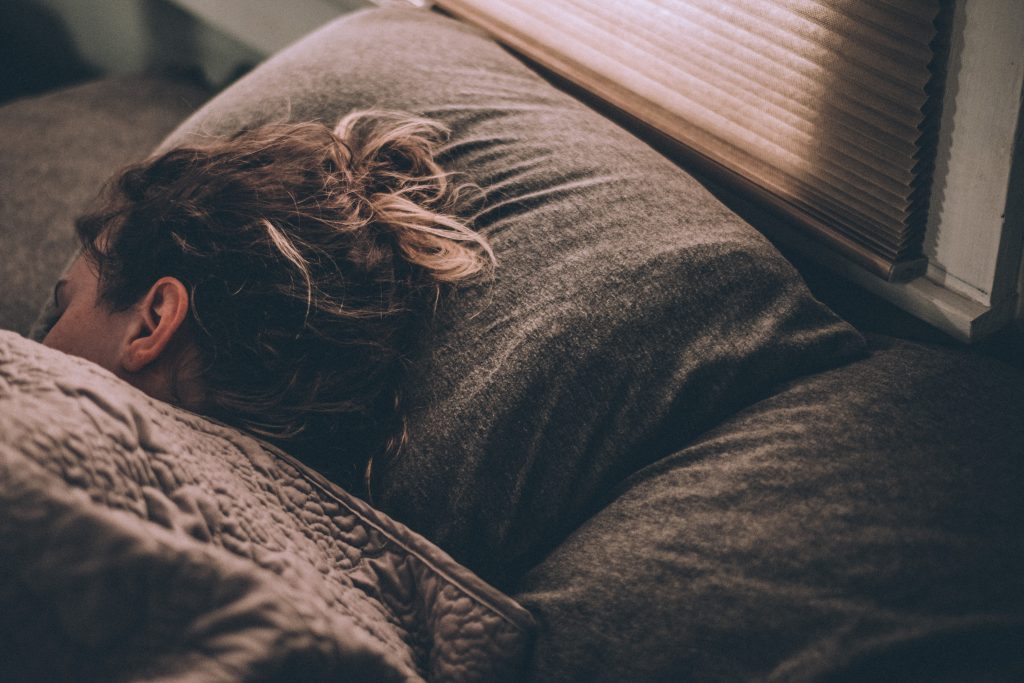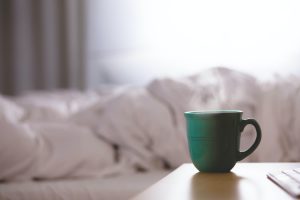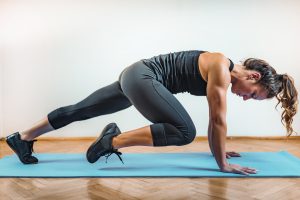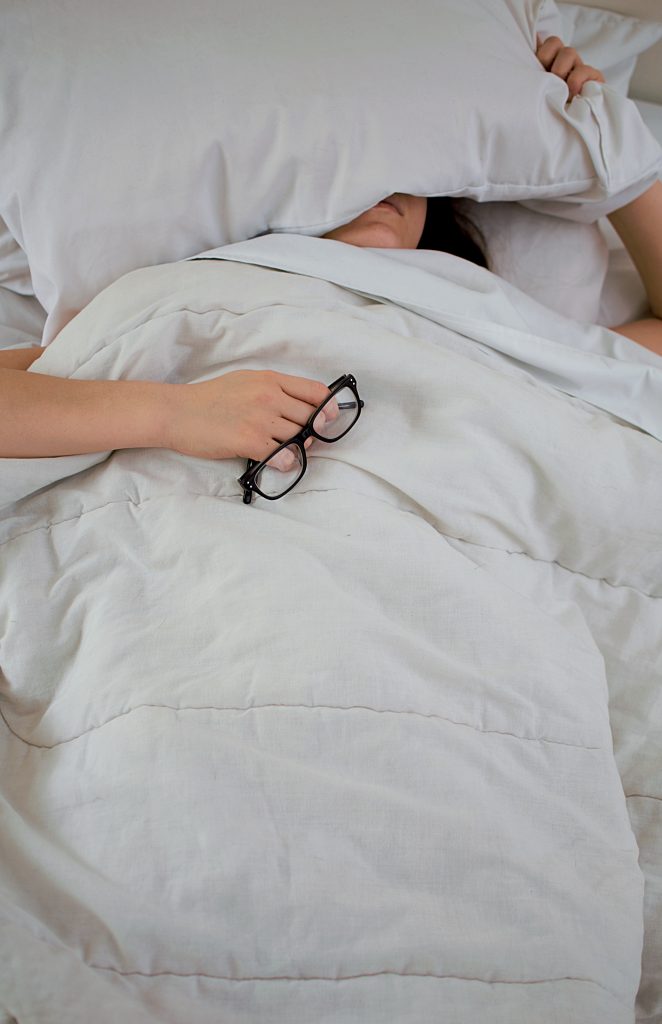
You hear it all the time:
“Want to get stronger? Sleep more.”
“Want to lose weight? Go to bed at a decent time every night.”
“Want a better meet? Get enough sleep.”
“Maxing out tomorrow, so be sure to go to bed early.”
Ok, but why? I find that often, my clients either question why they have to track their sleep, or unfortunately, they just skip tracking altogether (noooo, it’s sooo important). Whether their goal is fat loss, general health, contest prep, or powerlifting, getting sufficient sleep is critical to stay on track. In fact, lack of sleep can be detrimental and actually “reverse” progress. Thus, the connection between sleep and fitness should never be overlooked – and I’m going to tell you why.

First off, it is recommended to aim for 7 – 9 hours of sleep a night. That seems to be the sweet spot to ward off any negative effects and gain potential health benefits. However, the average American currently only sleeps 6 hours and 31 minutes a night during the week (yikes). It is proven that when you get less than 7 hours of sleep at night, impairments in the brain can occur! You can expect to see negative effects in terms of fat loss and performance will decrease while the likelihood of injuries will increase. It’s also important to note that long-term, sleep deprivation can lead to a diminished quality of life and increase the likelihood of developing certain chronic diseases like Alzheimer’s, diabetes, and cancer. So maybe you think it’s a good idea now to run on 4 hours of sleep (I hear ya, trying to grind and get that extra work in), but you will start to pay for this later on in life. You’re also “paying for it” now.
Sleep and Weight Loss
When it comes to weight loss, lack of sleep will hamper your body’s ability to properly use insulin. Too little sleep can trigger a cortisol spike (a stress hormone associated with weight gain), which only means you’re more likely to maintain or accumulate fat. So now your lack of sleep is actually potentially reversing the fat loss that you’ve been working towards during the day.
Additionally, as leptin decreases, your stomach will begin to feel empty. Then, as ghrelin (also known as the “hunger hormone”) increases, your appetite will start to increase. Ever wonder why when you’re tired you also feel hungry? Well, it’s because you are both (go figure, right?). Sleeping less than 7 hours a night can trigger areas in your brain that makes you crave food. And not healthy foods either. Research has shown that lack of sleep can lead to greater portion sizes and less healthy food choices; thus, further increasing the chance of unnecessary weight gain. On average, people who sleep less than 5 hours a night will eat about 200 – 300 calories extra each day. So it’s really true that if you want to lose fat, you need more than 7 hours of sleep at night. There’s no way around it. This is the main reason I have my clients who are working towards fat loss or competition prep track and record how many hours of sleep they get each night.
Sleep and Athletic Performance
Sleep is important to the body’s physiological (reaction times, learning, and memory) and cognitive restoration. Think about when you learn a new task. Let’s say you are learning how to squat. At first, it’s difficult; you make mistakes and naturally have sticking points. When you are first learning, the movement won’t be automatic. You will really have to think about it! This is where sleep comes in to play. Sleep can actually help to make these movements feel more automatic. So after practicing good technique, simply sleep on it (for 7+ hours).
Sleep is where the magic happens! Your brain does crazy amounts of work and it’s no surprise that in several various studies performance improvements have been found in weightlifters and other athletes when sleep exceeded 7 hours each night.

Let’s talk about this concept a bit more for a minute because I think it’s important. When you sleep, your brain replays memory sequences that you learned throughout the day – but this time, the level of brain cells firing increases and is much faster. So with a good night’s rest, that squat you were practicing earlier will be more rehearsed and you will no doubt perform better when you wake up. There is a podcast that I highly recommend that talks about this with Joe Rogan, the Sleep Expert, and Neuroscientist Dr. Matthew Walker. The whole episode is quite interesting actually and definitely worth the listen. In the podcast, Dr. Walker claims that when you practice with a good night’s sleep, you can perform 20 – 30% better than the day before. But he also claims that with sleep deprivation (less than 6 hours), your physical exhaustion can drop up to 30%, a staggering difference.
Also, since peak muscular strength is correlated to sleep, the less sleep you have, the higher chance that your performance will be hindered. It’s also important to state that injury rates increase in athletes with a lack of sleep. There was a specific survey cited in the podcast I mentioned earlier, showing a perfect linear relationship between sleep deprivation and injury rate. In fact, there was a 60% increase in injury rates when they compared athletes who received 5 hours versus 9 hours of sleep. Why is this? A number of reasons actually. Exhaustion. Tiredness. Stability muscles start to fail. Shorter sleep periods do not allow time for cells to repair and regenerate. So after workouts and training, the inability to fully recover will wear and tear, and eventually, will increase the likelihood of serious injuries. Pairing sleep with scheduled rest days, deloads, and taking time off when you feel like you need to is critical to healthy and efficient training.
“…WHEN YOU PRACTICE WITH A GOOD NIGHT’S SLEEP, YOU CAN PERFORM 20 TO 30% BETTER THAN THE DAY BEFORE.”
Now that we’ve covered the basics of why sleep is important for fat loss and athletic performance, let’s summarize and highlight a few more important benefits and drawbacks you can expect from your sleeping habits.
Benefits of Adequate Sleep (7 – 9 hours each night):
- Reduces the chance of stress-related illness
- Improves immune functions
- Improved strength
- Higher energy levels to function throughout the day
- Reduce stress and anxiety
- Improves overall mood
- Higher performance levels
- Maximizes workouts
- Minimizes feelings of hunger

Potential Consequences of Sleep Deprivation (6 hours or less):
- Higher injury risk
- More likely to skip workouts altogether
- Increases chance of snacking, binging
- Lower peak muscular strength
- Less clarity, more likely to make poor decisions
- Cravings and hunger will increase
- Ability to expire carbon dioxide and inhale oxygen in lungs decreases
- Less self-control when it comes to food choices
- Ability to process insulin is disrupted
- Lactic acid will build up faster
- Shorter lifespan diminished quality of life
- Link to Alzheimer’s, obesity, diabetes, cancer (breast, bowel, prostate)
- Will slow down the production of growth hormone
Okay, so that’s a lot. Right? And now, maybe you are wondering how you can improve your sleep. Insomnia. Trouble sleeping. Anxiety. Staying asleep. These are all common issues I hear from clients, friends, and family. I too sometimes have a difficult time sleeping. Luckily, I have a few tips for you on how you can achieve better sleep and in turn, better health.
Tips for Better Sleep
- Try to stick to a schedule. Regular sleep routines (waking and sleeping the same time each day will help drastically).
- Limit light one hour before bedtime (no screen time, turn lights off, etc.). An hour of screen time can delay the production of melatonin by three hours and will lead to less REM sleep.
- Avoid alcohol and heavy meals before bed.
- Turn down the heat and keep it cool (your brain needs to drop temperature to initiate sleep). I personally cannot sleep in the heat and this explains why.
- When you work out regularly, your sleep will likely improve. Fitness and sleep really go hand and hand. Following a well-structured fitness program can help you fall asleep faster and stay asleep longer.
So there you have it. I think Kobe Bryant said it best when he claimed that, “Sleep is one of the best performance enhancers there is.” Not drugs. Not supplements. And bonus, it’s free.
Get some sleep my friends.
XO,
Coach Nat
Sources:
“Sleep Expert and Neuroscientist Dr. Matthew Walker.” The Joe Rogan Experience. April 2018.
“Is Too Little Sleep a Cause of Weight Gain?” Mayo Clinic. Katherine Zeratsky R.D., L.D. May 2018. <https://www.mayoclinic.org/healthy-lifestyle/adult-health/expert-answers/sleep-and-weight-gain/faq-20058198>
“Sleep More, Weigh Less.” WebMD. 2016 <https://www.webmd.com/diet/sleep-and-weight-loss#1>
Leave a Comment